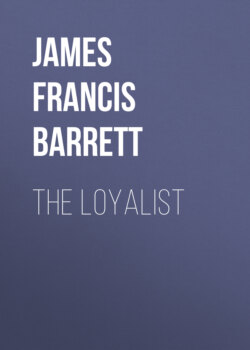Читать книгу The Loyalist - James Francis Barrett - Страница 15
На сайте Литреса книга снята с продажи.
II
ОглавлениеTable of Contents
"And you live alone with your father and mother?"
Marjorie and her partner were sitting in a distant corner whither they had wandered at the conclusion of the dance. Stephen began to find himself taking an unusual interest in this girl and was inquiring concernedly about her home life.
"Yes, Father's time is much consumed with his attention to the shop. Mother and I find plenty to occupy us about the house. Then I relieve Father at times, and so divide my hours between them," quietly answered Marjorie.
"You have not as yet told me your name," Stephen reminded her.
"Marjorie," was the timid reply.
"Marjorie!" Then, taking advantage of her averted look, he stole secret glances at her small round face, her lips, firmly set but curving upwards, her rose-pink cheeks. Presently, his eye rested on her finger-ring, a cameo with what looked like an ectypal miniature of the "Ecce Homo." Was this girl of his faith?
"Marjorie Allison," he repeated again. "Do you know that sounds like a Catholic name?"
"It is," Marjorie replied proudly. "Our family have been Catholics for generations."
"Mine have, too," Stephen gladly volunteered the information. "Irish Catholics with a history behind them."
"Is your home here?" asked Marjorie.
"Here in this country, yes," admitted her escort. "But I live in New York and it was there I volunteered at the outbreak of the war, and saw my first service in the New York campaign."
"And are your parents there, too?" inquired the girl.
And then he told her that his father and mother and only sister lived there and that when the war broke out he determined to enlist in company with a number of his friends, the younger men of the neighborhood. How he took part in the campaign about New York and his "contribution to our defeat," as he styled it. Of the severe winter at Valley Forge and his appointment by Washington to his staff. She listened with keen interest but remained silent until the end.
"And now you are in the city on detailed duty?"
"Yes. Work of a private nature for the Commander-in-chief."
"It must be a source of satisfaction to be responsive to duty," observed Marjorie.
"It is God's medicine to detach us from the things of this world. For, after all has been said and done, it is love alone which elevates one's service above the domain of abject slavery. In such a manner do the commands of heaven afford the richest consolations to the soul."
"And still, a certain routine must manifest itself at times."
"Not when the habit is turned to pleasure."
"You are a philosopher, then?"
"No. Just a mere observer of men and their destinies."
"Have you included the duration of the war in your legitimate conclusions?"
"It is not over yet, and it will not terminate, I think, without an improvement in the present condition of affairs. The proposed help from France must become a reality of no ordinary proportion, else the discordant factions will achieve dire results. Tell me," he said, suddenly changing the topic of conversation, "were you in attendance at the Mischienza?"
"No, I did not care to attend."
"I would I had been present."
"You would have been expelled in your present capacity."
"Ah, yes! But I would have affected a disguise."
"You would expect to obtain important information?" She fingered her gown of pink satin as she spoke, oblivious of everything save the interest of the conversation.
"I might possibly have stumbled across some items of value."
"None were there save the British Officers and their Tory friends, you know."
"A still greater reason for my desire to be present. And why did you not dance attendance?" This question was frank.
"Do you really want to know my sole reason?" She looked at him somewhat suspicious, somewhat reliant, awaiting her womanly instinct to reveal to her the rectitude of her judgment.
"I should not have asked, otherwise," Stephen gravely replied.
"Well, it was for the simple reason that my soul would burn within me if I permitted myself to indulge in such extravagance and gayety the while our own poor boys were bleeding to death at Valley Forge."
Stephen grasped her hand and pressed it warmly. "You are a true patriot," was all he could say.
Whether it was his emotion for the cause of his country or the supreme satisfaction afforded him by the knowledge that this girl was loyal to the cause, Stephen did not know, nor did he try to discover. He knew that he was thrilled with genuine gratification and that he was joyously happy over the thought which now relieved his mind. Somehow or other he earnestly desired to find this girl an ardent patriot, yet he had dared not ask her too bluntly. From the moment she had entered the hall in company with the other girls, he had singled her alone in the midst of the company. And, when the summons came to him from the Governor, he had seen her standing at the side of the dais, and her alone. Little did he suspect, however, that she bore his billet, nor did he presume to wish for the pleasure of her exclusive company for the evening.
She danced with grace and was wholly without affectation. How sweet she looked; pink gown, pink flowers, pink ribbon, pink cheeks! How interesting her conversation, yet so reserved and dignified! But she lived in the city and the city he knew teemed with Loyalists. Was she one of these! He dared not ask her. To have her so declare herself enraptured him. She was one of his own after all.
